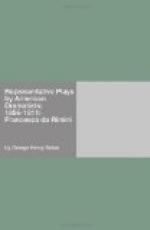The only American drama on the subject is that by Boker; it is a peculiarly contradictory piece of work, since, from the standpoint of the stage, it is essentially and effectively dramatic, while as literature it is imitative of the Elizabethan style. Boker’s poetic imagery is distinctly borrowed, and his choice of words disappointingly colloquial. Yet, over and above the mere story, he has succeeded in portraying a strong character in his Pepe. The historical setting of the play is slight, yet sufficient to localize the piece, and his dramatis personae are faithfully distinct in outline, though at times devoid of consuming passion.
Phillips as a dramatist has the fault of being diffuse; Boker’s style is prosaically plain. Were it not for over-elaboration, D’Annunzio’s play might supplant all others because of its spirit. Could we take from Phillips his simplicity, from D’Annunzio his Italian intensity, and from Boker his proportion, and could we add these to Crawford’s realization of situation, toned away from his melodramatic tendencies, an ideal drama on “Francesca da Rimini” might be constructed.
But the revitalizing power that was given Shakespeare, has been bequeathed to none who have followed Dante. The one beauty of the Francesca story is the simple element that permeates the dark motive. The genius required to deal with it lies in this: to make one conscious of the tragedy in a touch that recalls the beauty of spring.
It is strange that no other poet than Dante has succeeded in catching this beauty. No poet, writing directly on the theme, has the subtle feeling which may be compared with that of the Italian. Richard Le Gallienne is infinitely superior to Hunt; Lowell and Gilder beyond the lesser poets,—but all fade before the master. They treat of the vision of Hell, with its whirling wind; of the two in close embrace; there is the kiss that ends the reading of a self-same love; there is the flash of a dagger that joins them eternally in death. These are the themes for the songs. The artists have done with brush and pencil, what the poets have tried in sonnets and verse. But it is Dante who dominates them everyone.
To me, after tracing in part the development of this Italian tragedy, there remains the charm of Dante’s simplicity, and were one to ask, who, among the moderns, have partially reflected his passion, I should turn to Keats’ insatiable thirst for beauty in his sonnet, “A Dream, After reading Dante’s Episode of Paolo and Francesca,” and his account of it in a letter to George and Georgiana Keats (February 14, 1819), and to Carlyle’s appreciation of tragedy and love, in “The Hero as a Poet.”
Boker’s “Francesca da Rimini” will stand largely because, in structure and in directness, it is strikingly effective for the stage.
[Footnote A: Duyckinck recalls that, in 1862, R.T. Conrad’s “Devotional Poems” were published, edited by Boker.]




